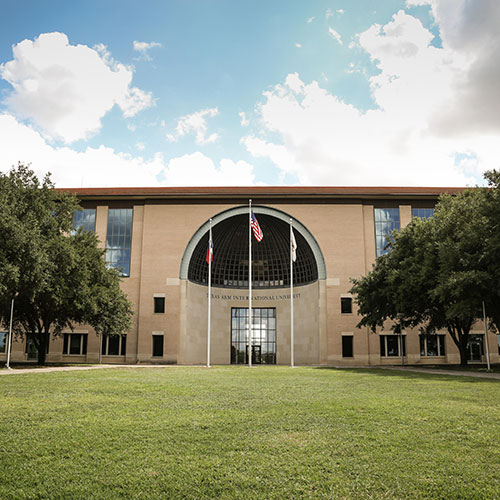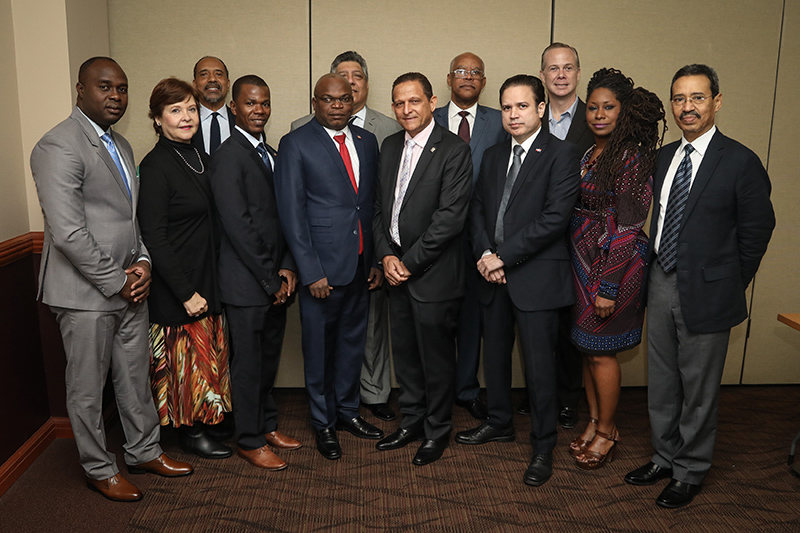TAMIU Hosts Dominican Republic, Haiti in Signing of Historic Cross Border Cooperation Agreement

Texas A&M International University’s (TAMIU) Office of Global Initiatives helped facilitate the creation of a historic, bi-national, cross border cooperation agreement document between the Dominican Republic and Haiti, which representatives from the two countries signed this week on campus.
Congress members and Ministry representatives from both the Dominican Republic and Haiti met during a three-day visit to Laredo this week to learn how bi-national cooperation on the U.S.-México border works. The officials also heard presentations from Mexican consular and congressional representatives.
The visit, hosted by TAMIU’s Office of Global Initiatives, was coordinated with the U.S. Embassy in Santo Domingo, D.R. and Port Au Prince in Haiti, as well as the U.S. Consulate General in Nuevo Laredo.
María Eugenia Calderón-Porter, assistant vice president for Global Initiatives, explained the signed agreement serves to solidify both countries’ commitment to work together to stimulate industrial development, international trade, quality of life at the border and access to infrastructures that support the development and expansion of their border businesses in addition to accessibility to low-cost energy from nearby markets.
“The commitment on behalf of the parties includes the creation of a short and long-term vision plan, a budget for the implementation of the border development plan, support of bi-national business initiatives, and promotion of public-private partnerships,” Calderón-Porter explained.
“The Office of Global Initiatives’ mission is to engage in leadership, education, research and public service works with all levels of U.S. governments in order to fulfill this mission,” Calderón-Porter said, “In the case of the republics of Haiti and the Dominican Republic, we partnered with the U.S. Department of State and embraced their vision of transforming their borders into a vibrant hub of business, trade and quality of life for their bi-national residents.”
Calderón-Porter continued, “We had them observe the model of our Laredo, Texas-México border success and we walked them through the process of what could be applicable to their border.”
The Office of Global Initiatives will meet with the group throughout the planning and implementation process of the agreed upon border plans and installations, and will work with with government officials in relation to public policy development and bilateral agreements, Calderón-Porter said.
“The model for this new approach to border development for Haiti and the Dominican Republic will be our inland port of Laredo, Texas,” she said.
Dominican Republic Congressman Dario Zapata, said that the visit to Laredo was beneficial to his country’s delegation.
“This experience has been tremendous, extraordinary, positive and good,” Zapata said, “I think that we dream and hope that between the Dominican Republic and Haiti, we can implement the type of agreement and system of customs, immigration, transportation, logistics and efficient education that exists between the United States and México.”
Zapata said that the idea is to replicate the U.S.-México cooperation model between the Dominican Republic and Haiti.
“During this visit, we’ve succeeded in forming a bi-national committee between the Dominican Republic and Haiti as a form of an initiative in order to solidify and carry out those model agreements being implemented in Laredo and México so that this will be so in the Dominican Republic and Haiti,” he said.
Max Antoine, executive secretary of the Technical Border Commission of Haiti, said this has been a workshop between government colleagues of the Dominican Republic and Haiti so that they can together identify a common program for border development.
“That program has to do with economic development, social development, betterment of the environment” said Antoine, “Most certainly, we will have to be watchful also about the topic of border security and through all those topics, strengthen the harmony, friendship and cooperation between our two countries.”
Antoine continued, “During our visit, we’ve also had the wonderful opportunity to share with Congress members from México who came here to speak to us, offer us their assistance and share with us their great experience when it comes to border issues. As such, with the support of the U.S. government, through the embassies in Haiti and Santo Domingo, the support of TAMIU and Mexico, Haiti and the Dominican Republic have great support to be able to face the challenges of the border.”
TAMIU’s Office of Global Initiatives/Binational Center works to enhance relationships between the United States and other countries within the Western Hemisphere by promoting civic and social organizations and institutions through research, education, leadership, and public service. The Binational Center is a member of the World Affairs Councils of America, the largest national non-partisan network of almost 100 councils in over 40 states dedicated to educating and engaging Americans on the critical global issues of the time.
For more information, contact Calderón-Porter at the Office of Global Initiatives: 956.326.2834, email binationalcenter@tamiu.edu, visit offices in Anthony J. and Georgia A. and Pellegrino Hall, Suite 301, or click on http://www.tamiu.edu/binationalcenter/index.shtml
